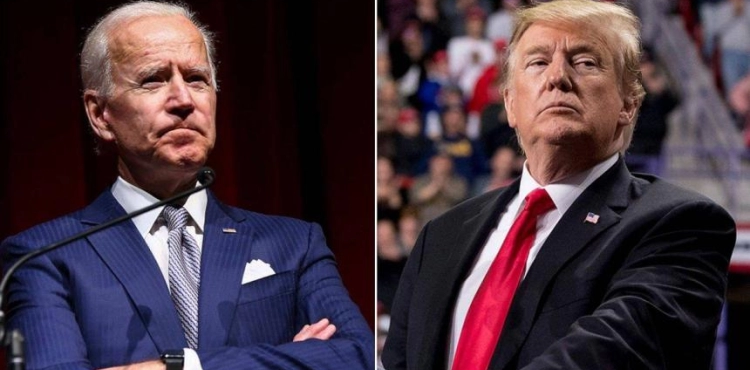The campaign of Democratic presidential candidate Joe Biden, on Sunday, sought to maintain its focus on "the nation´s response to the emerging corona virus epidemic," while US President Donald Trump is undergoing treatment for COVID-19 in a hospital. Walter Reed Military.
Medical examinations confirmed that Biden, who participated in the debate with Trump last Tuesday, at seven feet from each other, was free of the Corona virus for the third time on Sunday, after two negative tests on Friday, the day Trump revealed that he had COVID-19. And the day Biden chose to campaign in front of voters in swing state Michigan.
Biden also resumed his personal campaign on Monday in Florida, where polls show Trump and Biden competing for 29 votes in the Electoral College (state group of delegates) less than a month before the November 3 election.
It is noteworthy that Biden got his biggest progress in a month in the US presidential race after President Donald Trump tested positive for the Corona virus, as the majority of Americans believe that Trump could have avoided infection if he had taken the virus more seriously, according to a poll conducted by Reuters / Ipsos Sunday.
The poll, conducted on October 2 and 3, gave little indication of support for the president pouring out of the core group of Trump´s followers, some of whom had gathered outside the Walter Reed National Military Medical Center, where the president was hospitalized. Among the adults who are expected to vote in the November 3 elections, the poll found that 51% support Biden, while 41% said they would vote for Trump. While 4% chose a third party candidate, 4% said that they have not decided yet.
Biden outperformed Trump by 10 points, one to two points higher than the average Biden published over the past several weeks, although the increase is still within the poll´s accuracy limits of 5 percentage points or more. With about a month left before the election, Biden maintained an early advantage in securing the national popular vote. But to win the presidency, the candidate must win in enough states to win the Electoral College (Commission of Delegates) consisting of 538 votes, which assumes that the candidate gets 270 votes to win the presidency.
Polls show that Trump and Biden are still vying for 5% of the undecided voters.
It is noteworthy that it was the undeclared or unresolved voters who pushed candidate Donald Trump into the White House in 2016, and they are partly credited with why his victory was so surprising. And a number of experts believe that the president once again has a chance to influence those voters who have yet to make up their minds, but that may not be enough to beat the lead of Democratic candidate Joe Biden.
On this issue, Newsweek magazine attributed John Gere, a professor of political science at Vanderbilt University, as saying: “The unstable voters (who have not decided their position yet) know President Trump and are hesitant because they do not like him; they may end up voting for him, but It is unlikely that the vote will go hard in his favor. "
And a Quinnipiac University poll showed that the number of undecided voters was only 5% - a drop of roughly 5% over the same time in 2016.
In another poll conducted by the Washington Post and ABC News, it was found that 92% of the 1,008 people surveyed plan to choose either Trump or Biden for the presidency. Among those who did not choose Trump, 9% said they would consider casting a vote for him - the same percentage of people who did not choose Biden but would consider voting for him.
In a NBC News and Wall Street Journal poll released Monday, it was found that of the 1,000 registered voters surveyed, 3% were unsure about whom they would support while 3% said they did not support any of the candidates.
In 2016, Trump took advantage of his being unknown as a political candidate, so those who knew they did not want to support Democratic candidate Hillary Clinton, who was very well known to American voters, voted for him. Therefore, after four years in the presidency, Trump no longer has that advantage.
A poll conducted by the New York Times in cooperation with Siena College (New York State) found that Trump´s behavior in the debate between him and Biden on September 29 alienated voters in two crucial states, Pennsylvania and Florida, where Biden advanced by seven percentage points, 49%. Versus 42%, among potential Pennsylvania voters; It advanced by a similar margin, 47% to 42%, among potential voters in Florida.
The polls began last Wednesday, before the announcement on Friday morning that President Donald Trump had been infected with the emerging coronavirus. There was modest evidence of a shift in Biden´s favor in interviews conducted on Friday, including in Arizona where a survey is currently being conducted by The Times and Siena College (New York State).












